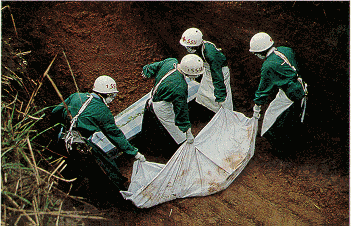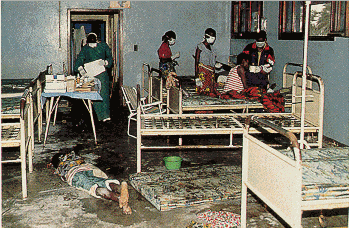Ebola Management and Therapy
For people who are unfortunate enough to become infected with Ebola or Marburg,
there is not very much that medicine can do to cure them. The only thing that
can be done for them is to give them intensive supportive care, as they usually
become dehydrated and need intravenous fluids.
-


Promising New Experimental EHF Treatments:
- High-titered hyperimmune horse anti-Ebola serum has been protective
in baboons experimentally challenged with Ebola (1).
- Monoclonal antibodies from the marrow of Ebola survivors (2)
- A potential, promising vaccine that offered considerable protection
against Ebola to guinea pigs (3).
- In mice used as a model for Ebola infections, a series of nucleoside
analogue inhibitors of S-adenosylhomocysteine hydrolase provided
protection against Ebola-Zaire when administered within 2 days of Ebola-Zaire
infection.
References:
- Kudoyarova-Zubavichene NM, et al. "Preparation and use of hyperimmune
serum for prophylaxis and therapy of Ebola virus infections."
Journal of Infectious Diseases 1999; 179(Suppl 1):S218-23.
- Maruyama T, et al. "Recombinant human monoclonal antibodies
to Ebola virus." Journal of Infectious Diseases 1999;
179(Suppl 1):S235-9.
- Ling Xu et al. "Immunization for Ebola Virus Infection."
Nature Medicine 1998;4 [abstract from].
- Huggins, J. et al. "Antiviral Drug Therapy of Filovirus Infections:
S-adenosylhomocysteine Hydrolase Inhibitors Inhibit Ebola Virus
in Vitro and in a Lethal Mouse Model." Journal of Infectious
Diseases 1999; 179(Suppl 1):S240-7.
©1999 Tara Waterman



